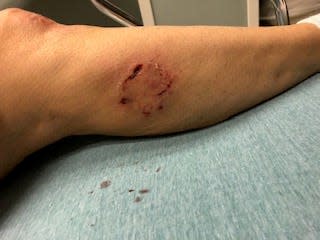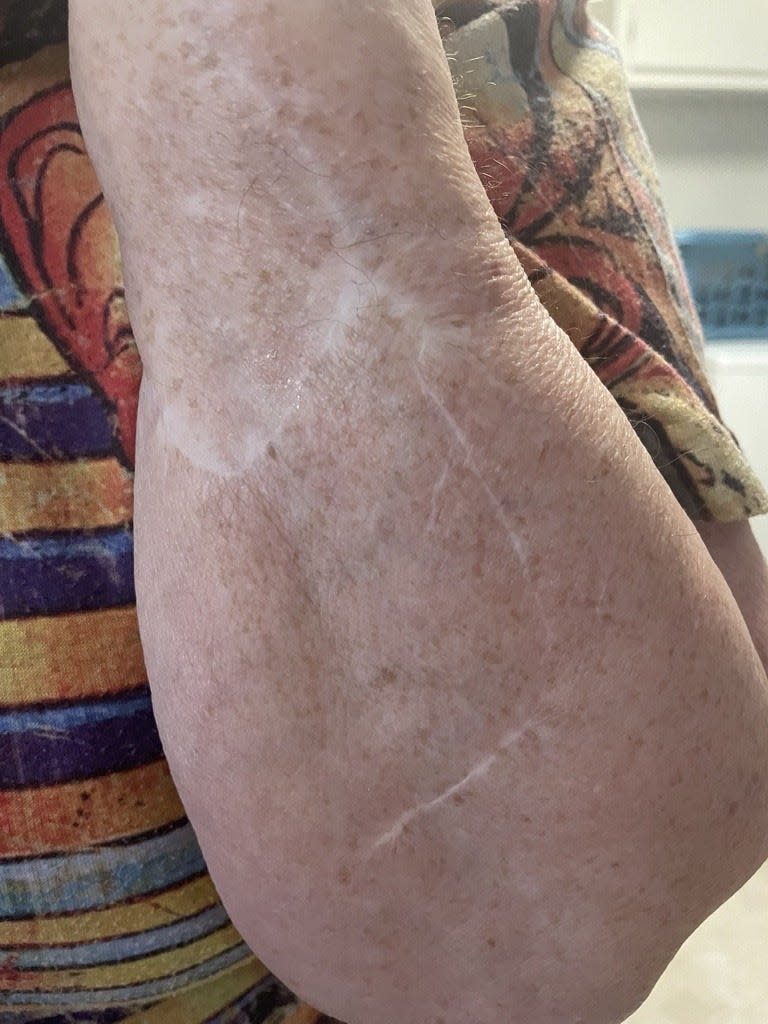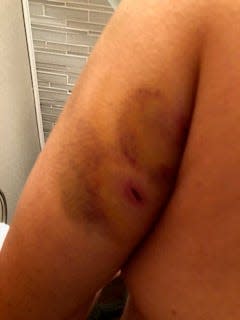Dogs are mauling and killing more people. What to do about it pits neighbor against neighbor
Corrections & Clarifications: An earlier version of this story misattributed a white paper about breed-specific legislation from the American Dog Breeders Association and other groups.
Anxiety still overtakes Santina Pado whenever a dog is not on a leash. Her phone’s heart monitor signaled a possible cardiac arrest on a family vacation last year when she saw one leaped to greet a woman standing next to her.
The moment brought back the sheer terror of being attacked by a pack of dogs on her daily stroll in rural Fayette City, Pennsylvania. A brindle boxer and four others leaped at her, teeth gnashing, and ravaged her arms, back, and leg. She collapsed, screaming, and suffered a heart attack.
"This is it," she thought. "This is the last day I'm going to have on this earth."
A passerby jumped out of his car and fired a gun into the air, scaring the dogs away. Pado later learned two of them had bitten people before. Yet their owner allowed them to run loose.
More and more in recent years, dogs have bitten, mauled and killed in America. Just in the past two weeks, a husky killed a newborn baby in Tennessee, and an 83-year-old man died in the jaws of unleashed dogs in Alabama.

In the past decade, the number of fatal dog attacks more than doubled, from an average of roughly 40 a year to nearly 100 after the pandemic hit, according to the Centers for Disease Control and Prevention. The number of bites each year has also increased, experts say, from the most recent estimate 20 years ago of 4.5 million to untold millions today.
But how to stem the growing numbers of canine attacks is sharply divisive, pitting neighbor against neighbor, and advocates against condo boards, local councils and state governments. Some have passed leash laws or bans on certain breeds. A dozen states require that dogs have computer chips implanted with a record of any past aggression.
Some say dogs that attack or exhibit signs of acute aggression should be euthanized. Others say they can be rehabilitated and deserve the chance at happy lives, and that breed-specific bans are discriminatory, disproportionately impacting the poor and people of color.
Still, advocates and experts say the status quo is not enough and more must be done to save lives, particularly as millions more households took in pets since the pandemic – some 23 million by one estimate.
"You see how crazy this has gotten," Colleen Lynn, founder and president of DogsBite.org, a nonprofit organization dedicated to reducing serious dog attacks. "It's happening more and more."
Lynn says it's time for the government to step in and force better dog management. "Management means everything," she said. "It means training, it means euthanasia if you can't handle it."
Dog bites and fatal attacks can be 'completely unprovoked'
The details are crushing.
A 4-year-old riding his bike was slain by a family friend's bulldog in Alabama. A man in Los Angeles was fatally attacked by his own pit bulls. A stay-at-home mother in Georgia was mauled to death in her yard as she tried to save her children from a pack of dogs.
A 3-month-old baby was killed by the family dog in New Jersey, and two weeks ago, a six-week-old was killed as he napped in his crib in Knoxville, Tennessee. Parents Chloe and Mark Mansoor decided to donate little Ezra's organs and speak out on local TV to warn others.
"To just bring awareness that it could be any dog at any time – completely unprovoked," Chloe Mansoor told WVLT. "No matter what the history is."


The tragic toll in 2024 just keeps climbing.
Jim Crosby, a research associate at Harvard University's Canine Aggression Project who tracks dog bite-related fatalities, said there's no way to tell how many dog bites happen each year in the United States. Emergency room visits due to dog bites decreased from almost 363,000 in 2012 to 317,000 in 2021, according to CDC estimates. But getting an overall bite total would require piecing together those estimates from hospital records with health department and industry records, including insurance data.
"None of those databases talk to each other," he said. "So, there's a huge issue with getting decent numbers and there's an even bigger issue with reporting."
Crosby and others who track dog attacks believe they have increased along with the boom in dog ownership during the pandemic. Even before the pandemic, the number of dogs in the U.S. shot up by at least 6.9 million from 2016 to 2020, according to the American Veterinary Medical Association.

Crosby believes other factors are also fueling the spike in attacks. He said dogs raised during the pandemic missed out on crucial socialization and interaction with other dogs as they holed up with their owners during extended lockdowns. Once their owners returned to office jobs, the dogs were left alone at home, further depriving them of social contact.
"We have been seeing a lot more problem behavior cases from the dogs that have come up and were adopted during the period of COVID," Crosby said.
He and Mike Shikashio, a dog aggression expert and certified dog behavior consultant, noted that increased demand for dogs in recent years may have upped the pressure on dog suppliers.
"Some of the shelters were adopting out dogs that maybe shouldn't have been adopted out," Shikashio said.
Crosby said with stretched resources, few shelters have the capacity to work intensively with individual animals over weeks to rehabilitate them, he said, and in some cases putting them down may have been better than adopting them out.
"Nobody wants to see animals needlessly killed, but there's also the public safety question," Crosby said.
Attack 6-week-old baby fatally mauled in crib by family dog in Tennessee
More: Philadelphia officer shot, killed 2 dogs that attacked young woman breaking up dog fight
Julie Castle, CEO of the Best Friends Animal Society, says society needs to do better and provide whatever resources are necessary.
"Why, as the wealthiest country in the world, are we talking about how to best kill our best friends rather than how to best save our best friends?" she said.
Castle said giving dogs "the right environment and the right routine" could produce "incredible improvement" in aggressive dog behavior.

Lawmakers turn to 'dangerous dog' legislation
The white scars that run from Kathleen Culpepper's elbow to her wrist are a permanent reminder of the day she was rushed to emergency surgery after her landlady's dogs mauled her in her front yard in Virginia.
A neighbor scared them away before they killed her, but not before they ripped her arm apart. In the ambulance, emergency medics couldn't start an IV because Culpepper's vein collapsed. Making the arm usable required two operations.

"It just was ugly," she said. "The guy just patched me together to hold the skin on."
The dogs had bitten her before, landing her in the emergency room. This time they were euthanized.
Virginia is one of a vast majority of states – 42 and the District of Columbia – that have "dangerous dog" laws on the books, according to the Animal Legal and Historical Center at Michigan State University's College of Law.
It's also one of a handful of states, including New Jersey and Louisiana, that require all dogs deemed "vicious" by a court to be euthanized. Culpepper never pursued a court order after the first bite – she was scared her living situation would be jeopardized and she couldn't afford to move.

In almost all cases, a fatal dog attack is "going to result in the dog being killed," said David Favre, a professor at the college and editor-in-chief of the Animal Law Web Center.
If a dog is legally found to have a propensity for violence, "then you'll be able to keep the dog only so long as you abide by a set of conditions for protection of the public," Favre said. Those conditions range from muzzling a dog to barring a minor from owning it.
In at least 12 states and the District of Columbia, dangerous or potentially dangerous dogs must have a microchip implanted or, in some cases, be tattooed. Both Virginia and Pennsylvania maintain registries of dangerous dogs.
"The idea is that you're trying to prevent future harm," Favre said.
What will stem the number of dog attacks?
Florida is considering a measure named after a postal worker killed by five dogs in 2022, Pamela Jane Rock. It would force the registration of dangerous dogs, require owners to have liability insurance, and mandate the "destruction" of repeat-offending dogs.
Dog attacks on postal workers shot up to more than 5,800 cases last year, according to figures released last week by the U.S. Postal Service. That's 500 more than in 2022.
Lynn, president of the dog attack-reduction group DogsBite.org, wants more laws requiring shelters to disclose dogs' aggression records.
"So many people in the public don't even understand that they are getting a dog with a bite history when they go to a shelter, period," she said. "So, mandatory bite disclosure is a way that they can't get away with that anymore."
She and others say instituting bans and restrictions on dog breeds deemed more dangerous is another solution. DogsBite.org singles out "dangerous dog breeds, chiefly pit bulls," and says cities and counties in at least 14 states that implemented laws regulating dog breeds reduced dog attacks or dog bites.

Proponents of breed-specific legislation point to studies like one from 2019 that concluded bites from pit bulls are "more frequent and severe."
But opponents say such measures can come with a litany of problems. Jessica Simpson, senior public policy specialist for the Humane Society of the United States, said pit bulls are "a broad categorization of an animal and not a particular breed of dog" and are typically identified by appearance, which can be misleading. She said singling them out can contribute to housing instability for their owners and also discourage owners from getting help or training for fear their dogs will be seized.
"It's costly to enforce because people bring lawsuits, civil suits against this stuff and then obviously, it impacts resources," she said.
Advocacy organizations, including The Humane Society, and some legal scholars, say breed-specific legislation can be racist.
Ann Linder, an associate director of the Animal Law & Policy Program at Harvard Law School, concluded: "pit bulls were perceived as most commonly belonging to people of color – specifically, young, Black males." A white paper published in 2020 from the American Dog Breeders Association and other groups said banning or restricting them, including through homeowner insurance exclusions, can effectively be a form of "redlining," discriminatory practices that have kept people of color from moving into white and wealthy neighborhoods.
A study of Denver's pit bull ban, in place for more than 30 years, also found enforcement primarily targeted the city's most vulnerable areas and communities of color – particularly where "racially diverse communities intersect with predominantly white neighborhoods."
The Humane Society advocates for replacing the laws with dangerous dog laws. Simpson said at least 21 states have banned breed-specific legislation.

Dog attack survivors face steep medical bills, crippling anxiety
After racking up $12,000 in medical bills and two years of healing, including six months of physical therapy, the lingering effects of the dog attack on Pado's daily life in Pennsylvania now are mostly psychological.
Even though the dogs that bit Pado had attacked others before, euthanasia is mandated in Pennsylvania only after a dog kills someone, or a dog previously ruled "dangerous" causes severe injuries or its owner repeatedly fails to register, insure or microchip it.
In October, Gov. Josh Shapiro signed a law trying to discourage people from harboring dangerous dogs by doubling registration fees for them to $1,000 and jacking up fines for unlicensed dogs to as much as $500.

The dogs that attacked Pado during her walk in 2022 were put down afterward. She is still trying to return to her daily routine of walking a 3.5-mile loop every day. She recalled trying last year, setting off on the rural trail once again.
"I thought, I'm not going to let these animals stop me from doing stuff that I like."
But a mile in, anxiety overtook her. She called her husband to pick her up.
"That's my challenge, to see if I can do it," she said. "So far I haven't been able to do that."
Cybele Mayes-Osterman is a breaking news reporter for USA TODAY. Reach her by email at cmayesosterman@usatoday.com. Follow her on X @CybeleMO.
This article originally appeared on USA TODAY: Dog bite death toll spikes as search for answers divides communities


